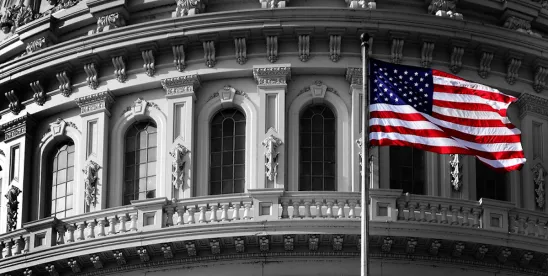The enhanced unemployment benefits created by the March 27 CARES Act are set to expire in eight days. The US Congress will need more time than that to determine a path to passage of the next major bipartisan pandemic response legislation – assuming Republicans and Democrats in Washington are able to eventually reach agreement on such a measure at all. While conventional wisdom for months has held that this week would be marked by the official start of formal negotiations among congressional leaders and the White House to cobble together a new large-scale coronavirus relief and economic stimulus bill, congressional Republicans and the Trump Administration have instead spent the week negotiating among themselves. These discussions will reportedly culminate as soon as today in the introduction by Senate Majority Leader Mitch McConnell (R-KY) of a set of bills – to be known collectively as CARES II, according to POLITICO – that will finally represent the GOP’s opening bid in talks with their Democratic counterparts.
Topics covered today include: US federal budget and appropriations, tax and economic development, health, international trade, government oversight and investigations, and US state level developments.
Publication note: Following a modified schedule, the next briefing will be available on Tuesday, July 28, 2020.
The McConnell package will take a spartan approach that is certain to be unsatisfying to some Republicans and rejected outright by congressional Democrats, who have rallied behind a sweeping US$3.5 trillion coronavirus response bill (the HEROES Act) passed by the House in May. HEROES included nearly US$1 trillion in new federal money for states, territories, cities and counties. Republicans argue there are still billions of dollars left in the pipeline from the original CARES Act that states and local governments have been unable to access due to rigid guidelines. The McConnell CARES II approach is likely to provide flexibility to allow state and local governments to now access those funds, along with robust new money for K-12 schools and colleges, tied to plans for reopening educational institutions this autumn – but no significant new infusion of cash for state and local governments.
The Senate GOP package will call for an additional round of direct “stimulus” payments to individuals and households, a goal supported by President Donald Trump, while omitting the payroll tax reduction also favored by Trump. A GOP leadership source said Wednesday that it is not possible to provide both the direct payments and the payroll tax relief sought by the White House without expanding the size of the package well beyond the range deemed acceptable by McConnell, who is striving to keep the introductory measure limited to roughly US$1 trillion. The Senate Republican package is also likely to include “pro-growth” provisions to support the resurgence of the US economy, with an emphasis on domestic manufacturing and research and development, the source indicated.
Even with the GOP agreement announced Wednesday night, consensus among Washington policymakers on the size and scope of the potential new package remains a distant prospect, with the two parties set to enter talks with vastly different priorities and agendas for the anticipated new measure. The gulf between Democrats and Republicans on state and local funding is mirrored by disagreements between the parties on a range of other key issues as well, from the path forward on unemployment benefits to the question of whether money for schools should be tied to plans for reopening. Tension within the Republican ranks is likely to remain a factor in the negotiations, with McConnell, Treasury Secretary Steven Mnuchin, White House Chief of Staff Mark Meadows and House Minority Leader Kevin McCarthy (R-CA) walking a tightrope as they strive to craft a deal that will be viewed as acceptable by President Trump and the members of the House and Senate Republican conferences – constituencies that have historically been difficult to satisfy when it comes to striking bipartisan deals of the sort necessary for governing.
A senior congressional Republican source acknowledged Wednesday that there is a chance Congress will leave town for its traditional August break next month without having passed a measure of any kind, but predicted the expiration of the CARES Act’s unemployment benefits will ultimately compel lawmakers to forge an agreement.
Appropriations Updates
As negotiations between House and Senate leadership, and the Trump Administration, begin in earnest on the next COVID-19 relief package, the appropriations process in the House continues to move forward with the goal of wrapping up deliberations on fiscal year 2021 spending bills in the lower chamber by the end of July.
The House of Representatives today begins debate on H.R. 7608, the first of two must-pass appropriations packages providing funding and shaping public policy for the fiscal year that begins on October 1. The US$259.5 billion funding proposal is comprised of four of the 12 individual spending bills – State and Foreign Operations, Agriculture, Interior and Environment, and Military Construction/Veterans Affairs.
The House Rules Committee, which sets the overall parameters for House debate, reported a rule last evening that the House must approve prior to House consideration of the State, Foreign Operations, Agriculture, Rural Development, Interior, Environment, Military Construction, and Veterans Affairs Appropriations Act of 2021. This afternoon, the House will adopt – likely in a party-line vote – a structured rule for debate of the spending proposal that makes a total of 132 amendments in order for consideration across the four bills.
Upon adoption of the rule, the House will engage in one hour of general debate – equally controlled and divided between the chair and ranking member of the House Appropriations Committee. Following general debate, consideration of amendments will commence with Division A, the State, Foreign Operations funding bill. The rule provides for 10 minutes of debate on each amendment, equally divided between the proponents and opponents of the amendment. Multiple amendments may also be combined and offered en bloc, in which case they are debatable for 30 minutes. Each of the four bills, or divisions, will be debated and amended separately. At the conclusion of deliberations on Friday, the House will pass the funding package largely along party lines, setting the stage for future negotiations with the Senate and White House.
Significant policy and funding differences within each of the four spending bills have created deep partisan divisions that will be on full display during floor debate. House Appropriations Committee Ranking Member Kay Granger (R-TX) reflected this sentiment: “While I appreciate the Majority including many key Republican priorities, the bills violate the agreed-to budget caps and contain troubling policies that I simply cannot support.”
Even as the House begins consideration of the first spending package, the House Rules Committee has set a 4:30 p.m. deadline today for the submission of potential floor amendments to a second, US$1.367 trillion funding proposal (H.R. 7617) the House will consider next week. As presently comprised, this seven-bill package will include Defense; Commerce, Justice, Science; Energy and Water Development; Financial Services and General Government; Homeland Security; Labor, Health and Human Services, Education; and Transportation, Housing, and Urban Development Appropriations bills.
Internal divisions within the House Democratic Caucus have elevated concerns about the Homeland Security bill’s inclusion within the pending seven-bill package. At a time when immigration and federal policing practice are under scrutiny in the US, progressive Democrats, in particular, are raising concern over combining the Homeland Security measure with other popular funding bills, including the Labor-Health and Human Services spending bill, which enjoys wide support within the majority party in the House. At the present time, the Committee plans to proceed with consideration of the legislation and is encouraging House members to address specific concerns through the amendment process.
House passage of the 12th and final spending bill – the Legislative Branch measure – remains elusive, for now at least, as the legislation maintains a longstanding prohibition against raising pay for Members of Congress, and includes a new provision requiring the removal from the US Capitol of statues and busts of individuals with ties to the US Confederacy.
Tax and Economic Development Updates
After much debate, it appears that Senate Republicans and the White House have reached agreement on their version of the next COVID-19 relief legislation. According to Senate appropriator Roy Blunt (R-MO), Republicans plan to introduce “several bills that come together as a package.” This approach may well be the result of time pressures stemming from the forthcoming August recess and Republicans’ inability to come together on a number of key issues, including how to address the US$600 per week expanded unemployment benefits that are currently set to expire at the end of the month. Politico yesterday reported that sources on Capitol Hill have indicated that “[t]he proposal is expected to include a temporary flat payment for unemployment insurance for two months”; however, it appears that Republicans are considering alternatives to that approach, including by leveraging the Employee Retention Tax Credit enacted as part of the CARES Act to help get employees back to work. In terms of what appears to have been agreed to as of this morning, reports suggest that the Senate Republican package will contain a number of tax and economic development provisions, including another round of direct payments to individual taxpayers, additional funding for the Paycheck Protection Program (PPP), and greater flexibility for state and local governments in using federal financial assistance. Further, despite President Trump’s push for a payroll tax cut, Republican skepticism led to Treasury Secretary Steven Mnuchin this morning announcing that the initial proposal would not include this tax policy change.
Given that the PPP may receive additional funding as part of this next COVID-19 package, it is important to note that Small Business Administration (SBA) Deputy Chief Information Officer Guy Cavallo testified yesterday before the House Committee on Small Business to provide an update on SBA’s technology systems. Of particular relevance, Mr. Cavallo discussed the SBA’s efforts to update its “E-Tran” system, which is used to approve PPP loans. Mr. Cavallo’s testified that while “[s]ignificant progress has been made in SBA’s IT modernization journey…there is still more to be done in modernizing some of the key mission support systems”; he also made clear that the SBA’s “IT modernization is a journey that needs perseverance, consistent leadership support, and the efficient use of resources.”
As noted in Tuesday’s report, while Congress remains focused on its economic response to the ongoing public health crisis, former Vice-President Joe Biden this week released details surrounding the “third plank” of his economic plan, which is focused on the “caring economy” (i.e., child and elderly care). According to a report from Bloomberg, “a senior campaign official said a Biden administration would take aim at so-called like-kind exchanges, which allow investors to defer paying taxes on the sale of commercial real estate if the capital gains are reinvested in another property. The official also said they would prevent investors from using real estate losses to lower their income tax bills.” The report also provides additional details about the so-called third plank of Vice President Biden’s economic platform, which “calls for universal preschool for three- and four-year-olds. It also eliminates the waiting list for home and community services under Medicaid, offers low-income and middle-class families a tax credit of as much as $8,000 to help pay for child care and increases pay for caregivers and early childhood educators.”
Other developments of note since Tuesday’s report:
- The Securities and Exchange Commission yesterday voted to adopt amendments to its rules governing proxy solicitations designed to “ensure that clients of proxy voting advice businesses have reasonable and timely access to more transparent, accurate and complete information on which to make voting decisions.”
- The Commodity Futures Trading Commission yesterday approved a final rule regarding new capital and financial reporting requirements for swap dealers and major swap participants, which “marks the completion of the CFTC’s required rulemakings under Section 731 of the Dodd-Frank Act, which was enacted 10 years ago this week.”
- The Office of the Comptroller of the Currency yesterday published a letter clarifying national banks’ and federal savings associations’ authority to provide cryptocurrency custody services for customers.
- The Treasury Department and Internal Revenue Service (IRS) earlier this week issued final regulations addressing the treatment of income earned by certain foreign corporations that is subject to a high rate of foreign tax. Specifically, the final regulations allow taxpayers to exclude certain high-taxed income of a controlled foreign corporation from their Global Intangible Low Taxed Income (GILTI) computation on an elective basis. The Treasury Department and IRS also issued proposed regulations regarding the high-tax exception with the GILTI high-tax exclusion. Additionally, the IRS announced that it is setting up a new office to “support overall IRS modernization and implementation of long-term changes stemming from the Taxpayer First Act.”
Health Updates
The US public health emergency declared on March 13 is set to expire on July 25. Without its extension, increased federal financial support for state Medicaid programs would cease on September 30. While Department of Health and Human Services (HHS) spokesman Michael Caputo tweeted on June 29 that HHS “expects to renew the Public Health Emergency (PHE) due to COVID-19 before it expires,” and, “we have already renewed this PHE once,” no official announcement has been made. The Families First Coronavirus Response Act, passed in March, increased the federal Medicaid match to states by 6.2% and tied it to the emergency declaration. While the enhanced funding has been helpful, some state and local leaders have requested further assistance. In a letter to congressional leaders, the National Governor’s Association, National Conference of State Legislatures, National League of Cities and other state and local national organizations asked for a 12% Medicaid match in the next stimulus package, and asked Congress to apply the increase retroactively. The House-passed HEROES Act authorized a 14% match from July 1, 2020, through June 2021. Other Medicare and Medicaid flexibilities would also cease, including loosened restrictions on telehealth and the suspension of certain safety rules and other regulations which have allowed hospitals to move patients to makeshift off-site locations and reduced the amount of supervision required for certain non-physicians to provide services.
On Wednesday, HHS, in conjunction with the Department of Defense, announced its US$1.95 billion purchase of 100 million doses of a COVID-19 vaccines in development by Pfizer, Inc., once it receives safety and efficacy approval. Pfizer is collaborating with German biotechnology company BioNTech and has not received federal funding for the medication’s development. The vaccine is currently in Phase 1/2 trials, and initial doses could be delivered after completion of Phase 3 trials, as soon as October 2020. The agreement will also allow the government the ability to acquire up to an additional 500 million doses.
Also on Wednesday, the Centers for Medicare and Medicaid Services (CMS) announced the distribution of US$5 billion from the Provider Relief Fund (PRF) to nursing homes. According to the release, funding may be used “to address critical needs in nursing homes including hiring additional staff, implementing infection control ‘mentorship’ programs with subject matter experts, increasing testing, and providing additional services, such as technology so residents can connect with their families if they are not able to visit.” CMS will also begin requiring all nursing homes in states with a 5% positivity rate or greater test all nursing home staff each week, and plans to provide more than 15,000 testing devices to assist in those efforts over the next few months. Finally, CMS, in collaboration with the Centers for Disease Control and Prevention (CDC), will be offering online training focused on infection control and best practices. The training will be a requirement to receive funds from the PRF.
Trade Updates
On Wednesday, Indian Prime Minister Narendra Modi and US Secretary of State Mike Pompeo suggested India as an alternative partner for those businesses seeking to leave China, in separate remarks hosted by the US-India Business Council. The two praised bilateral relations, but did not address talks aimed at securing a trade deal, which have been in a holding pattern for months.
As expected, US Customs and Border Protection on Wednesday announced that restrictions on nonessential travel across US borders with Mexico and Canada will remain in place until at least August 20. The restrictions – which do not impact commercial travel, including the movement of trucks – have been in place since late March.
Thursday afternoon, the House Ways and Means Trade Subcommittee will hold a hearing titled “Trade, Manufacturing, and Critical Supply Chains: Lessons from COVID-19.” The panel will hear from non-governmental witnesses representing unions, academia, the NGO community, and trade associations. The hearing comes as administration officials and lawmakers consider whether and how to incentivize a shift of supply chains to the United States. Much of this discussion has focused on pharmaceutical and medical products, but businesses operating in many categories of manufacturing faced supply chain disruptions as countries around the world implemented stay at home orders in response to the virus. Whether and how best to best incentivize a return to the US has not been on the table for the next round of COVID-19 relief legislation, but could garner more focus in the next Congress.
Oversight Updates
On Tuesday, James Clyburn (D-SC), Chairman of the House Committee on Oversight and Reform’s Select Subcommittee on the Coronavirus Crisis, sent a letter to Labor Secretary Eugene Scalia, seeking documents and communications regarding his department’s implementation of paid leave provisions in the Families First Coronavirus Response Act (FFCRA). While Congress passed the law to make the leave widely available during the pandemic, Chairman Clyburn noted that the Department of Labor’s (DOL’s) rule allows millions of businesses to deny FFCRA paid leave to their employees. The letter draws attention to DOL’s exemptions for certain health care providers and emergency responders from the definition of “eligible employee,” as well as the exemption of small businesses with fewer than 50 employees. According to Clyburn, these exemptions have “effectively given businesses the unchecked ability to carve out a large swath of American workers from receiving emergency paid leave.”
Yesterday, Senators Elizabeth Warren (D-MA), Jon Tester (D-MT) and Doug Jones (D-AL), joined by 25 of their Democratic colleagues, sent a letter to the Department of Housing and Urban Development, the Department of Agriculture, and the Federal Housing Finance Agency, urging the agencies to enforce bans on housing evictions for the duration of the pandemic. While the CARES Act created temporary protections from eviction for tenants in properties with federally-backed mortgages or who receive certain types of federal housing assistance, the senators heard testimony that communities in several states have allowed landlords to move forward with eviction proceedings.
Also yesterday, the House Committee on Homeland Security, chaired by Representative Bennie Thompson (D-MS), held a hearing on the national response to the pandemic, with Federal Emergency Management Agency Administrator Pete Gaynor testifying. The Committee invited the Department of Health and Human Services to send a representative to testify, but the administration refused, despite the Committee’s agreeing to its demands for an in-person hearing. Criticizing the administration’s refusal, Chairman Thompson emphasized that, “Congressional oversight is not only not optional, it is often the only way the Federal government will improve itself” and promised to demand transparency “until we get answers from this administration.”
Additionally:
- The US Attorney’s Office for the Eastern District of Virginia and the Office of the Special Inspector General for Pandemic Recovery have entered into a Memorandum of Understanding (MOU). The MOU’s goal is to promote collaboration in identifying and prosecuting fraud, waste and abuse of the money provided under the CARES Act. Special Inspector General Brian Miller vowed to “bring to justice those who would steal CARES Act money, and recover money for the taxpayers.” “Taxpayers should expect nothing less,” he added.
- A Massachusetts man has been charged with wire fraud, aggravated identity theft, and making a false claim to the United States in relation to Pandemic Unemployment Assistance.
State Updates
A recent POLITICO/Morning Consult poll found a bipartisan majority of registered voters strongly support state mandates that would impose penalties to individuals if they failed to wear a mask in public.
The poll, which was conducted online from July 17-19, and reached 1,991 registered voters across the country, showed 72% of all registered voters—86% of Democrats and 58% of Republicans—support a mask mandate. The poll’s margin of error is plus-or-minus 2 percentage points.
The approval for mask mandates comes as statewide orders by governors in more than half the states in the US are hoping to stop the spread of coronavirus. Recently Republican governors in states like Alabama, Arkansas, Ohio and Indiana (as of yesterday) have issued mask mandates, while top health officials are imploring the public to cover their faces. The president has also reversed course on mask wearing in recent days and in his return to his first White House briefing on the virus since April, encouraged Americans to wear one if they cannot socially distance from others.
While some governors have imposed fines or threatened legal actions for non-mask wearing compliance, other governors in states like Georgia and Florida are taking a different approach. In Georgia, Governor Brian Kemp (R) asked his state’s residents to “commit” to wearing a mask for four weeks despite his ongoing lawsuit against Atlanta officials for mandating a face covering be worn. In Florida, Governor Ron DeSantis (R) has continued to resist calls for a mask mandate, including in a recent letter from the state’s congressional delegation, to consider a mask mandate despite his state being among the top in the nation for coronavirus cases.
Researchers have found that mask wearing can prevent the spread of coronavirus by an infected person who is talking, sneezing or coughing. Top Trump administration health officials including CDC Director Dr. Robert Redfield, White House Coronavirus Task Force Coordinator Ambassador Deborah Birx, and head of the National Institute of Allergy and Infectious Diseases and member of President Trump’s Coronavirus Task Force Dr. Anthony Fauci have urged the public to wear masks, saying it is the best way to combat the virus.
This post was also written by Mara Sheldon, Meg Gilley and Genevieve Bresnahan.







 />i
/>i

